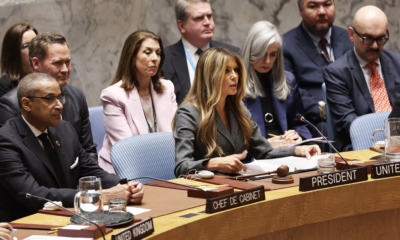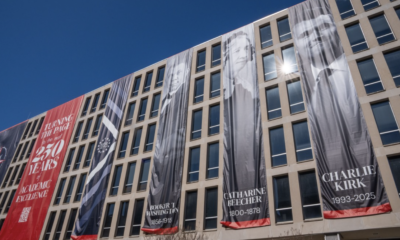Trump Presidency
Donald Trump’s DC Crackdown Raises Authoritarian Alarm
President Donald Trump’s emergency takeover of Washington, DC’s police department—and the deployment of National Guard troops onto the city’s streets—has ignited fierce debate over whether the move is a legitimate crime-fighting measure or a dangerous political stunt with authoritarian undertones.
In a press conference, Donald Trump painted a grim picture of the nation’s capital, calling it “overtaken by violent gangs and bloodthirsty criminals.” The rhetoric, however, stands at odds with official data: violent crime is at 30-year lows, with carjackings, gun crimes, and homicides down in recent years. DC Mayor Muriel Bowser, while acknowledging the city’s challenges, called Trump’s depiction exaggerated and “unsettling.”
Critics see the DC takeover as part of a broader second-term trend—Donald Trump’s increasing willingness to militarize civilian law enforcement and expand presidential power under the guise of “national emergencies.” Since returning to office, he has declared emergencies on the economy, energy, and border security, often without clear evidence of an immediate crisis.
Trump’s Name Appears in Epstein Files, DOJ Confirms: WSJ Report Sparks MAGA Outrage
The deployment in DC mirrors earlier incidents. In his first term, Donald Trump sent active-duty troops to the southern border and ordered Marines into Los Angeles during immigration-related unrest. Political historians note that using the military in policing roles is a hallmark of authoritarian regimes, where consolidating control over the capital is often a first step.
Members of Congress from the DC region warned of “a soft launch of authoritarianism,” while Los Angeles Mayor Karen Bass described the capital as a “test case” for future federal overreach into local governance.
Trump’s National Guard Order Blocked—Temporarily—as Legal Fight Over LA Deployment Heats Up
Still, Donald Trump’s move is not without supporters. DC Police Union Chairman Greggory Pemberton backed the president’s claims that crime is “out of control” in some neighborhoods, suggesting that federal help could bring relief to residents living in high-crime areas.
Yet, the political calculus is clear. By framing the situation as a law-and-order showdown, Trump positions Democrats who oppose the crackdown as “weak on crime,” regardless of the statistics. His comment that police are now “allowed to do whatever the hell they want” electrified his base, ensuring wall-to-wall coverage in conservative media.
The thing about Trump sending troops into DC is that he is still in the Epstein files. pic.twitter.com/WNrGz1ep2p
— Anonymous (@YourAnonNews) August 11, 2025
Defense Secretary Pete Hegseth, Attorney General Pam Bondi, and FBI chief Kash Patel flanked Trump at the announcement, a visual reinforcement of his “strongman” image. But the timing also conveniently diverted attention from a brewing controversy over unreleased files in the Jeffrey Epstein case—a reminder that Trump’s most dramatic moves often serve multiple political purposes.
Whether the DC takeover with the troop deployment becomes a lasting change or a short-lived spectacle remains to be seen. But history—and the Founders’ warnings—suggest that even symbolic uses of military force against civilians carry risks that go beyond politics.
For now, the streets of Washington may be calm, but the precedent has been set. And that could matter long after the troops are gone.










































Pingback: US Government Shut Down: Obamacare Fight Sparks Crisis